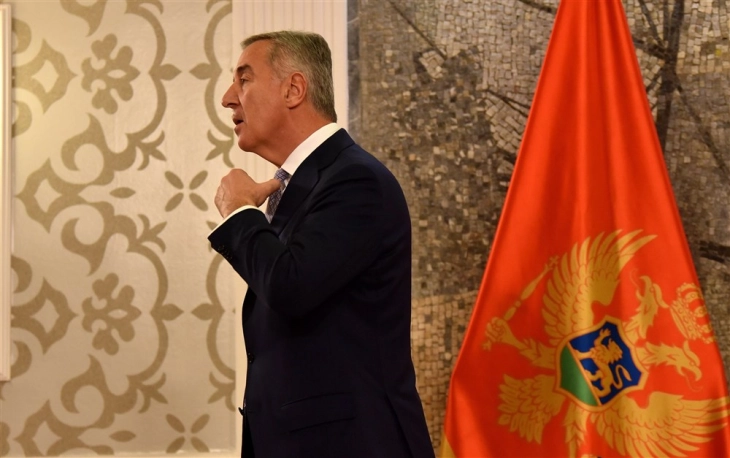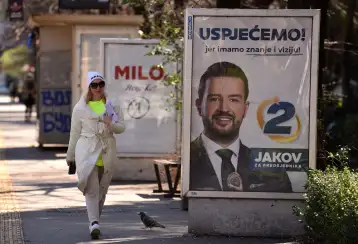Presidential Elections in Montenegro: Entering the Post-Djukanovic Era April 2, 2023 in Montenegro

The International Institute for Middle Eastern and Balkan Studies IFIMES from Ljubljana, Slovenia, regularly analyzes events in the Middle East, the Balkans and around the world. IFIMES analyzes the situation in Montenegro before the second round of the presidential elections, which will be held on April 2, 2023. From the analysis "Montenegro - Presidential elections 2023: Entering the post-Djukanovic era", we publish the most important and interesting parts.
On April 2, 2023, the second round of the presidential elections will be held in Montenegro. In the first round, which took place on March 19, 2023, the most votes were won by Milo Djukanović 119.673 votes (35,37%) and Jakov Milatović 97.858 (28,92%). The turnout was 64,06% (341551). The term of office of the president lasts for five years.
Milo Djukanovic (61), candidate of the Democratic Party of Socialists (DPS), economist by profession. He is competing for a third term as president of Montenegro, and he was prime minister of Montenegro five times. He is the president of the Democratic Party of Socialists.
Jakov Milatović (36), candidate of the "Europe Now" Movement, economist by profession, former Minister of Economic Development. He entered politics after the 2020 elections, which were a turning point for Montenegro. He is the deputy president of the newly founded "Europe Now" movement. Milatovic is pro-European and pro-Western, and that's what got him votes.
The presidential elections represent the final end of the long period of power of the Democratic Party of Socialists (DPS), which after the electoral defeat in 2020 also lost in the local elections. The defeat of Djukanovic would mean the final fall of the DPS, which had absolute power in Montenegro since the introduction of the multi-party system, that is, from 1990 to 2020. The president of the state in Montenegro has no greater powers. But the second round will be important for the fate of Djukanovic and for the parliamentary elections that will be held on June 11, 2023, although there is a possibility of their postponement.
Continuation of democratic changes
Milo Djukanovic came to power in 1989 through the so-called Anti-Bureaucratic Revolution of the wings of Serbian nationalism, led by Slobodan Milosevic. Djukanovic became one of Slobodan Milosevic's most trusted and closest collaborators. He established strong ties with Russia, which resulted in the privatization of state assets, as Russian owners became masters of about 30 percent of the Montenegrin economy. Djukanovic is an active participant in the military events on the territory of the former Yugoslavia, although he has not yet been prosecuted for that role. During the war in Bosnia and Herzegovina, he provided logistical support to Radovan Karadzic and his project to create the Republika Srpska.
Montenegro under the malignant influence of Djukanovic
The second round of the election campaign takes place in the creation of enemies by Milo Djukanović for the alleged threat to the statehood of Montenegro from the so-called the Greater Serbian project, the Serbian Orthodox Church (SPC) and Russia. In fact, the most harmful for Montenegro is the malignant influence of Djukanovic. Zarko Puhovski says: "In fact, we should not forget that in the meantime, what happened is that Montenegro (headed by Djukanovic) started to behave like Austria after the Second World War, so it declared itself the first victim of Milosevic, because Austria declared itself Hitler's first victim, not an accomplice in the war, as Austria and Montenegro were in both cases." Djukanovic still "sells" such a policy to Bosniaks and Albanians, not only in Montenegro.
The former president of Albania, Ilir Meta, for the so-called Great Serbian and Great Albanian projects, he declared: "Greater Serbia has failed, and Greater Albania is not possible."
Analysts believe that the regime of Milo Djukanovic should be exposed, because Montenegro is a full member of NATO, which means that it is subject to the highest democratic standards, which it should inherit and promote, and which it is still far from. Djukanovic's constructions are incredible, that Serbia wants and can attack the country, which is a member of the largest and strongest military alliance in the world, NATO. Also, Russia has yet to be recorded attacking any NATO member state since its inception in 1949, so making up enemies is Milo Djukanovic's constant.

Bosniaks and Albanians victims of Djukanovic
About 20% of the population (Bosniaks and Albanians) of Montenegro have been "hostages" of the Djukanovic regime for several decades, which through a few Bosniak and Albanian individuals and a few of their families, who enjoy the privileges of the regime, creates a false image of integration of these two ethnic communities, thus deceiving the domestic and international public about the supposed inter-ethnic harmony in Montenegro. Even the Bosniaks, as victims of the Djukanovic regime, were threatened by threats and forced to vote for their criminal. It refers to the war crimes committed and the genocide in Srebrenica, with which Milo Djukanović is connected, in the role of then President of the Government of Montenegro, who participated in the work of the Supreme Defense Council of the Federal Republic of Yugoslavia, as evidenced by numerous written documents . It is justified to ask the question whether Bosniaks have forgotten or are silent about the fact that Milo Djukanovic was Slobodan Milosevic's closest associate and that he remains the only high-ranking official from the wartime period who has not yet been prosecuted, although war crimes do not have a statute of limitations.
Analysts believe that the Bosniak and Albanian parties, if they want to "wash away" the stain from themselves, that they were collaborators and pillars of the regime, are on a kind of democratic and moral test, they have a chance to make a democratic turn and face the future, eliminating any further cooperation and support for Djukanovic and DPS. Since 1991, Djukanovic has developed a special relationship with the leadership of Republika Srpska. At the time of the international sanctions against the Federal Republic of Yugoslavia, the main military suppliers of Radovan Karadzic and Ratko Mladic were Djukanovic and his brother, aiding the war criminals' war machine, which resulted in the Srebrenica genocide. It is clear from Milo Djukanović's statements that for him Bosniaks and Albanians are just a "reservoir of votes" and nothing more. That is why it is important that the members of the minority communities do not succumb to the strong pressure of Djukanovic, because they have to build their future with other fellow citizens without Djukanovic, who is ending his political career.
The turnaround of the Bosniaks and Albanians will not be easy to do, as individuals from their parties are involved in crime and corruption, and some even in the military events in Bosnia and Herzegovina and Croatia along with Djukanovic. Djukanovic's crime and corruption are bigger than "Greater Serbia". The Republic of Croatia provides the most significant support to Milo Djukanovic's regime. Montenegro and Croatia found sponsors in China, but also in the Russian Federation. These two countries try to present and justify their non-transparent relations with China, but also with the Russian Federation as "good business moves".
With pen in hand to democracy
The presidential elections are being held at the time of the early parliamentary elections scheduled for June 11, 2023, and the visit of the Prime Minister of Montenegro, Dritan Abazović, to the United States. The presidential elections are the last opportunity to replace the last post that has not been changed in the country since 1989 – the post of president. The transition is considered complete when the office holders are physically and democratically removed from all key positions. Therefore, the upcoming elections will symbolically mean the end of the transition in Montenegro.
Analysts believe that in the upcoming presidential elections, it is important for the citizens of Montenegro, united in all their differences, without fear and foreign influences, to democratically oppose the decade-long regime of Milo Djukanović with pen in hand and to overthrow that regime, and finally Montenegro After 34 years, Gora defeated Djukanovic in a democratic way.
Although Milo Djukanovic came to power through the streets, he will be overthrown democratically. When leaving power, in addition to the votes of the members of the minority communities and the diaspora, young voters, who have to choose between the past and the future, will play an important role. A high turnout is important for the legitimacy of the future president.
The votes for Jakov Milatović are voters' support for EU membership, and his victory is an incentive that the EU should quickly admit Montenegro into membership. Stories of Serbian and Russian influence for a man who has studied and worked in the Western Hemisphere all his life are unfounded. If Milatović can be labeled as allegedly preferring some pro-Serb option, then it is also his quality that can be of use to Montenegro, to calm the current antagonisms in Montenegrin society and achieve the much-needed internal consensus for the future of the country.
Milatović may be acceptable to the majority of Montenegro. According to Milo Djukanović's matrix, all those who are his political opponents work for the Serbs, that is, for Serbia. Milatović should be aware of the fact that he will be responsible for a possible deviation from the path towards NATO and the EU, which could eventually cause internal conflicts in Montenegro. Milatović is a person who could balance between the two options in Montenegro, ie. between "West" and "East" in favor of the progress and bright future of that country.
It is important that positive processes have begun in the region that slowly but surely eliminate the bearers of crime and corruption, such as Nikola Gruevski (VMRO-DPMNE), Hashim Thaci (PDK), Boyko Borisov (GERB) and Milo Djukanović. (DPS) and Edi Rama (PS) came.
Analysts believe that Djukanovic's departure will pave the way for a faster approach of Montenegro to EU membership. At the moment, the European road is stopped and blocked precisely because of Djukanovic, and from April 2, the post-Djukanovic era begins in Montenegro.
IFIMES


